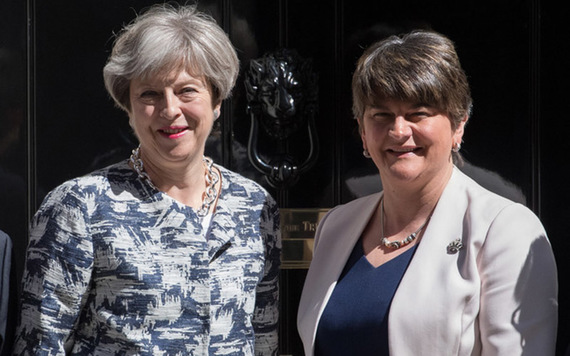One of the worst things about Brexit, the term we use for the hypothetical departure of the United Kingdom from the European Union, is that it will probably never end.
It's already the biggest political circus of our lifetimes, dragging on endlessly for this reason: the main Brexit backers have been slow to grasp this simple truth - leaving the European Union is a constitutional task so immense, so dauntingly complicated, it may never fully draw to a close.
This week the Democratic Unionist Party finally acknowledged what has been obvious to the Irish government for years: Brexit is simply not compatible with the Good Friday Agreement (which, in fact, the DUP never supported).
Instead of acknowledging that simple fact, however, the DUP and the Conservative Party have arrogantly criticized the Republic for our supposed intransigence. It's really our fault, you see.
Read more: 50% of Northern Irish would opt for a united Ireland after Brexit

Theresa May and Arlene Foster. Image: RollingNews.ie
“The Good Friday Agreement is not sacrosanct,” said DUP leader Arlene Foster announced this week. But in fact, the Good Friday Agreement was voted on by the people north and south and it was passed.
It is an international treaty, not some public park bylaw. It helped end decades of violence and it produced the longest period of stability and peace in the North's history.
Foster may find the Good Friday Agreement a deeply “frustrating” roadblock to her own private Brexit, but she forgets that the North voted to remain in the E.U.
A normal, non-threatening tweet from your average political party in the UK, of which we are an identical and integral part. Or else. https://t.co/IJe6Nf9zBS
— Matthew O'Toole (@MatthewOToole2) October 2, 2018
Blinded by her pursuit of what is good for one section of unionism, she is endangering the union itself by attacking the spirit and letter of the GFA.
By marching lockstep after her Brexit dream, she is uniting nationalist opinion in the North in a way no other unionist leader has ever managed to.
Journalist Eamonn Mallie is correct when he writes this week that “with her every utterance now she has become 'a recruiting sergeant' for aspirants of a United Ireland.”
Beguiled by the fever dream of Brexit, Foster is listening to a siren song that may yet lead Northern Ireland's union with Britain on to the rocks.
Who knew that Britain would find it so hard to disentangle itself from a genuine global superpower? It's almost as if the British thought they were still a superpower themselves.

Image: Getty
If they did that grave error is in the process of being corrected by international economic and political relations, reminding them they are a medium-sized market on the edge of a market of 500 million people.
So Brexit, it can now be said clearly, is more of aspiration rather than a fact. It's a bit like poetry, it sounds as if it should be true, but it's frustratingly elusive when you attempt to find it.
Brexit is like one of those idealistic white Christmas illustrations you see on a nice box of chocolates, all cozy country cottages with their windows all aglow, a Christmas tree twinkling, boxes of beautifully wrapped presents waiting to be opened, a robin at the window, a fireplace throwing a golden glow over all. It belongs to the heart, not the head.
Millions of British people voted for that white Christmas, in every sense of the word, and now they're frustrated to discover the cozy cottages and the golden glow were all an elusive mirage. Instead, they'll be living with austerity 2.0 and all the food and services shortages that accompany it. They were sold a bill of goods, in other words. The average British voter neglected to consider just how closely their economy is now enmeshed with the E.U.
Sadly, @DUPleader @duponline will continue to block the will of the people of Northern Ireland on marriage equality.
That’s why we need Westminster to legislate.@theresa_may @10DowningStreet @PennyMordaunt @NIOgov @LGBTCons are you with us or against us? pic.twitter.com/ft6WhKLJy3
— Love Equality NI (@Love_EqualityNI) October 2, 2018
Ask yourself, would you cheerfully do business with a partner who insists upon better terms for themselves and diminished ones for you? Ask yourself how do you negotiate from a position of strength when the entire world knows that Brexit was one of the most polarizing votes in British history - with 51.9 percent on one side and 48.1 percent on the other?
How do you even keep your own nation happy, knowing that Scotland and Northern Ireland both voted to remain in the E.U. and are increasingly restive over the mess that Brexit is making of their longstanding trade markets?
This is before we even consider that England (and Northern Ireland) has somehow produced the least able, transparently self-interested, conservative political leadership that it has seen in decades, arriving right on time to shepherd it through its biggest crisis since World War II, and possibly right over the cliff?
Some unionists in the North and some Tories in London think that the Republic of Ireland is mocking their car crash politics, taking pleasure in their perils, but nothing could be further from the truth.
Before the vote, the Irish government repeatedly warned the U.K. about the damage the that Brexit vote would do to the relationships between the islands, as well as to the very hard won and transformative Good Friday Agreement.
It was obvious to anyone with an ounce of sense that a breakup with Europe would have repercussions at home, but Brexit voters were beguiled by their visions of sovereignty, by their nostalgic white Christmas, and they would not listen to the Remoaners who wanted to inject some reality into the proceedings.
Arlene put her cards on the table this week: the unionist (and nationalist) choice now is between a modern community of nations or a backward, bigoted quasi-theocracy where only the favored find favor.
Scorned at home, loathed in London, beguiled by the siren song of Brexit. What a mess.
What do you think? Let us know in the comments section, below.




Comments